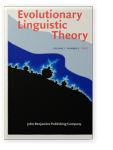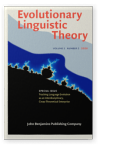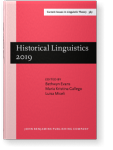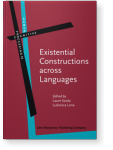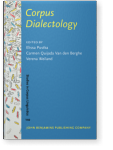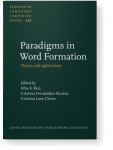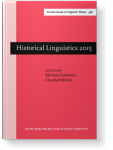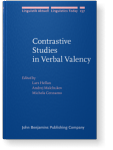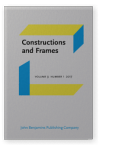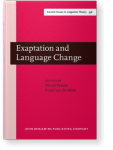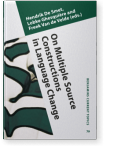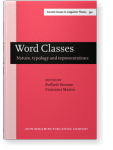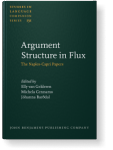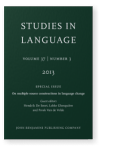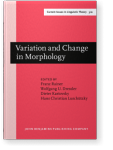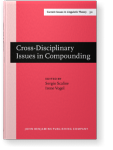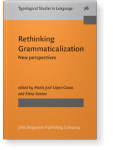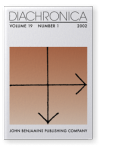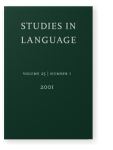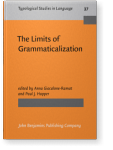Livio Gaeta
List of John Benjamins publications for which Livio Gaeta plays a role.
Journal
Title
Tracking Language Evolution as an Interdisciplinary, Cross-Theoretical Enterprise
Edited by Livio Gaeta
Special issue of Evolutionary Linguistic Theory 2:2 (2020) v, 103 pp.
Subjects Cognition and language | Evolution of language | Historical linguistics | Language acquisition | Neurolinguistics | Psycholinguistics
2024 Chapter 8. Iconicity principles from an evolutionary perspective Historical Linguistics 2019: Selected papers from the 24th International Conference on Historical Linguistics, Canberra, 1–5 July 2019, Evans, Bethwyn, Maria Kristina Gallego and Luisa Miceli (eds.), pp. 194–215 | Chapter
Much discussion has been devoted to the role of iconic coding, especially with regards to its relevance for explaining morphological change over other synchronic factors such as economy, frequency, and the like. In this chapter, I will reverse the perspective and focus on diachrony as a source… read more
2023 Chapter 4. Pure existentials vs. pure presentationals: Finding an existence out(side) of place Existential Constructions across Languages: Forms, meanings and functions, Sarda, Laure and Ludovica Lena (eds.), pp. 102–138 | Chapter
Existential constructions are usually defined as sentences in which an entity is associated with some location. In the paper, a semasiological approach is adopted, which is essentially constructional in nature and assumes that existential constructions result from the grammaticalization of other… read more
2023 “Going standard” on a blank page: A corpus-based approach to the written varieties of the Italian Western Alps minorities (Occitan, Francoprovençal and Walser) Corpus Dialectology, Pustka, Elissa, Carmen Quijada Van den Berghe and Verena Weiland (eds.), pp. 84–105 | Chapter
This chapter investigates non-standard languages, i.e., those which are dialectal, non-standardised – or standardised to a very limited extent, represented by the local linguistic varieties that populate the Italian Western Alps. Despite the fact that these have almost exclusively existed as… read more
2022 Chapter 1. Dangerous liaisons: An introduction to derivational paradigms Paradigms in Word Formation: Theory and applications, Ruz, Alba E., Cristina Fernández-Alcaina and Cristina Lara-Clares (eds.), pp. 3–18 | Chapter
2020 Remotivating inflectional classes: An unexpected effect of grammaticalization Historical Linguistics 2017: Selected papers from the 23rd International Conference on Historical Linguistics, San Antonio, Texas, 31 July – 4 August 2017, Drinka, Bridget (ed.), pp. 205–228 | Chapter
In Titsch, a Walser German dialect spoken in the Aosta Valley, a remodeling of the old strong/weak verb classes found in the rest of the Germanic languages has taken place, whereby verbs belonging to the strong class turn out to display both strong and weak past participles. This outcome results… read more
2020 Introduction: Language evolution as a cross-theoretical enterprise Tracking Language Evolution as an Interdisciplinary, Cross-Theoretical Enterprise, Gaeta, Livio (ed.), pp. 113–117 | Introduction
2019 Chapter 9. Anti-relevant, contra-iconic but system-adequate: On unexpected inflectional changes Historical Linguistics 2015: Selected papers from the 22nd International Conference on Historical Linguistics, Naples, 27-31 July 2015, Cennamo, Michela and Claudia Fabrizio (eds.), pp. 171–184 | Chapter
Several universal principles have been suggested that are supposed to limit the possible shape of inflectional systems, such as the Principle of Iconicity and the Principle of Relevance. The paper presents two case-studies which clearly falsify the expectations arising from these two principles and… read more
2017 Valency alternations between inflection and derivation: A contrastive analysis of Italian and German Contrastive Studies in Verbal Valency, Hellan, Lars, Andrej L. Malchukov and Michela Cennamo (eds.), pp. 327–373 | Chapter
Valency alternations are usually treated either as a lexical phenomenon resulting from the manipulation of the argument structure of a verb or as a context-conditioned variation resulting from the insertion of a verb into a certain syntactic configuration or construction. In the… read more
2017 Between VP and NN: On the constructional types of German - er compounds Constructions and Frames 9:1, pp. 1–40 | Article
This paper is concerned with the classification and analysis of different types of German synthetic compounds headed by deverbal agent nouns in -er, such as Romanleser ‘novel-reader’ or Gedankenleser ‘mind-reader’, where the non-head is seen to saturate an argument of the head lexeme while… read more
2016 Co-opting exaptation in a theory of language change Exaptation and Language Change, Norde, Muriel and Freek Van de Velde (eds.), pp. 57–92 | Article
In contrast with exaptation, which has been widely discussed over the last years, its conceptual counterpart in evolutionary biology, namely adaptation, does not seem to play any significant role in the actual linguistic debate. In the paper, the attempt is made to integrate this conceptual pair… read more
2015 Multiple sources for the German scandal construction On Multiple Source Constructions in Language Change, De Smet, Hendrik, Lobke Ghesquière and Freek Van de Velde (eds.), pp. 95–127 | Article
The interaction of several cases of grammaticalization going back to different source constructions may have dramatic consequences on a linguistic system. This paper discusses the so-called German scandal construction, which consists of a verbal complex displaying a number of synchronic… read more
2014 On decategorization and its relevance in German Word Classes: Nature, typology and representations, Simone, Raffaele and Francesca Masini (eds.), pp. 227–242 | Article
A distinction must be made between two different processes – decategorization and recategorization – (cf. Malchukov 2004), within the general phenomenon of transcategorization (cf. among others Simone 2008; Jezek & Ramat 2009). In particular, one may expect that losing certain word class properties… read more
2013 Existential constructions: A semasiological perspective Argument Structure in Flux: The Naples-Capri Papers, Gelderen, Elly van, Jóhanna Barðdal and Michela Cennamo (eds.), pp. 477–510 | Article
Existential constructions are normally defined as sentences in which some entity is associated with some location giving rise to the so-called locative paradigm which also involves the locative and the possessive construction (cf. Freeze 2001). In spite of the apparent simplicity of this approach,… read more
2013 Multiple sources for the German scandal construction On multiple source constructions in language change, De Smet, Hendrik, Lobke Ghesquière and Freek Van de Velde (eds.), pp. 566–598 | Article
The interaction of several cases of grammaticalization going back to different source constructions may have dramatic consequences on a linguistic system. This paper discusses the so-called German scandal construction, which consists of a verbal complex displaying a number of synchronic… read more
2010 The invisible hand of grammaticalization: West-Germanic substitutive infinitive and the prefix ge- Variation and Change in Morphology: Selected papers from the 13th International Morphology Meeting, Vienna, February 2008, Rainer, Franz, Wolfgang U. Dressler, Dieter Kastovsky and Hans Christian Luschützky (eds.), pp. 89–106 | Article
Grammaticalization may have therapeutic and pathological effects on morphology. The paper will focus on these latter with special regard to the occurrence of a morpheme in an unexpected form as is the case for the West- Germanic substitutive infinitive. The reason for this mysterious case of… read more
2010 Synthetic compounds: With special reference to German Cross-Disciplinary Issues in Compounding, Scalise, Sergio and Irene Vogel (eds.), pp. 219–236 | Article
This chapter focuses on a traditional issue of word formation, namely synthetic compounds. The three basic approaches to the question will be reviewed and analyzed with the help of a large text corpus. The latter is of paramount importance for the analysis because dictionaries usually are not… read more
2008 Mismatch: Grammar distortion and grammaticalization Rethinking Grammaticalization: New perspectives, López-Couso, María José and Elena Seoane (eds.), pp. 103–127 | Article
The paper investigates the potentially distorting impact of grammaticalization on grammar through the analysis of different types of synchronic form-meaning mismatches which may result from the expansion of a grammaticalization process. Grammaticalization may induce mismatches as a consequence of… read more
2002 Umlaut extension in German Modals as natural change Diachronica 19:1, pp. 1–41 | Article
Summary The umlauted forms of the German modals dürfen, mögen, müssen and können are unexpected from the viewpoint of the sound laws, and must be therefore explained in other ways. Despite more than one century of research, a convincing solution to this problem is still lacking. In this paper, a… read more
2001 Gapping in Classical Greek prose Studies in Language 25:1, pp. 89–113 | Article
The order of gapping has repeatedly been connected with the basic word order of a language. Such a view is inadequate for free word order languages, such as Classical Greek. Classical Greek allows both right- and leftward gapping; besides, some cases of bi-directional gapping are also attested. All… read more
1998 Some Remarks on Analogy, Reanalysis and Grammaticalization The Limits of Grammaticalization, Giacalone Ramat, Anna and Paul J. Hopper (eds.), pp. 89–105 | Article
